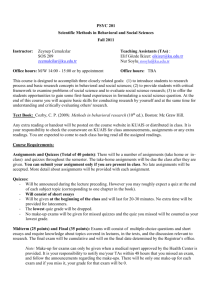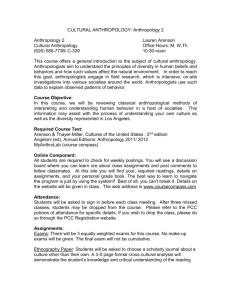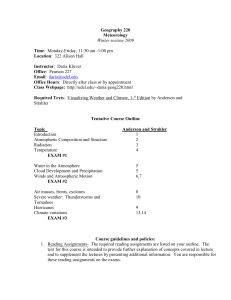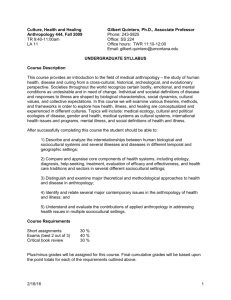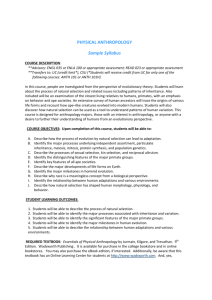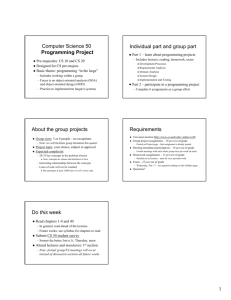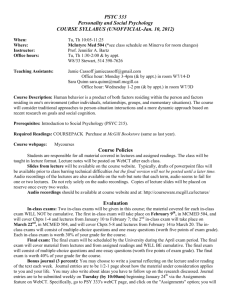Biological Anthropology 101 Syllabus
advertisement
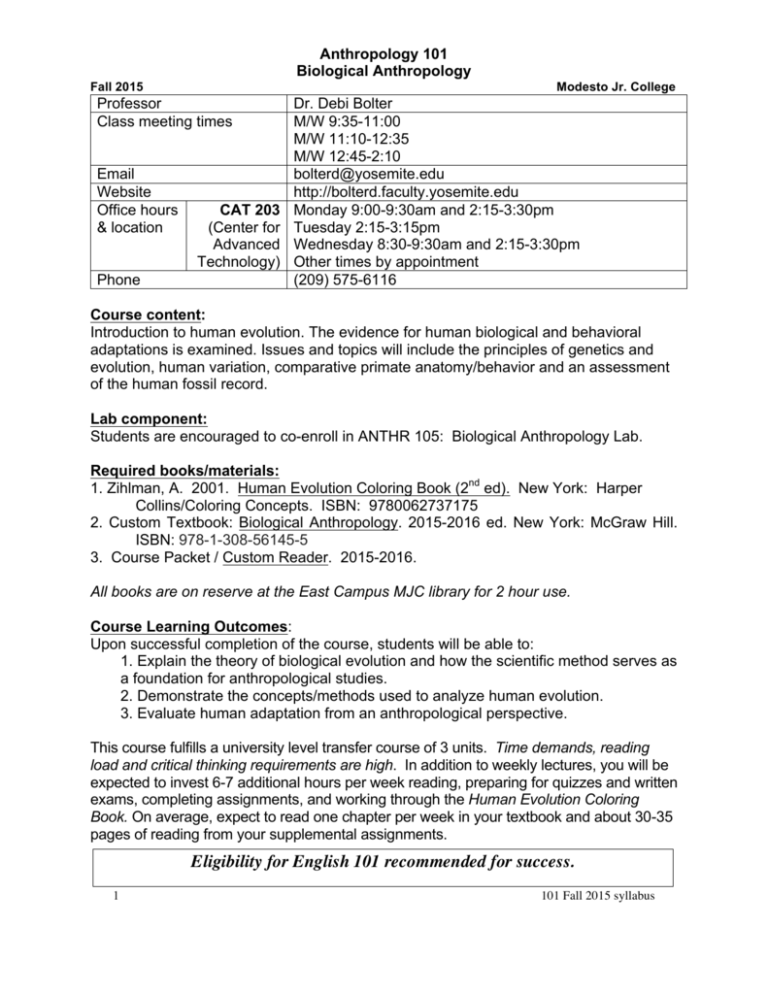
Anthropology 101 Biological Anthropology Fall 2015 Modesto Jr. College Professor Class meeting times Email Website Office hours & location Phone CAT 203 (Center for Advanced Technology) Dr. Debi Bolter M/W 9:35-11:00 M/W 11:10-12:35 M/W 12:45-2:10 bolterd@yosemite.edu http://bolterd.faculty.yosemite.edu Monday 9:00-9:30am and 2:15-3:30pm Tuesday 2:15-3:15pm Wednesday 8:30-9:30am and 2:15-3:30pm Other times by appointment (209) 575-6116 Course content: Introduction to human evolution. The evidence for human biological and behavioral adaptations is examined. Issues and topics will include the principles of genetics and evolution, human variation, comparative primate anatomy/behavior and an assessment of the human fossil record. Lab component: Students are encouraged to co-enroll in ANTHR 105: Biological Anthropology Lab. Required books/materials: 1. Zihlman, A. 2001. Human Evolution Coloring Book (2nd ed). New York: Harper Collins/Coloring Concepts. ISBN: 9780062737175 2. Custom Textbook: Biological Anthropology. 2015-2016 ed. New York: McGraw Hill. ISBN: 978-1-308-56145-5 3. Course Packet / Custom Reader. 2015-2016. All books are on reserve at the East Campus MJC library for 2 hour use. Course Learning Outcomes: Upon successful completion of the course, students will be able to: 1. Explain the theory of biological evolution and how the scientific method serves as a foundation for anthropological studies. 2. Demonstrate the concepts/methods used to analyze human evolution. 3. Evaluate human adaptation from an anthropological perspective. This course fulfills a university level transfer course of 3 units. Time demands, reading load and critical thinking requirements are high. In addition to weekly lectures, you will be expected to invest 6-7 additional hours per week reading, preparing for quizzes and written exams, completing assignments, and working through the Human Evolution Coloring Book. On average, expect to read one chapter per week in your textbook and about 30-35 pages of reading from your supplemental assignments. Eligibility for English 101 recommended for success. 1 101 Fall 2015 syllabus Quizzes and Exams: The quiz and exams may include practical I.D., fill-in, written short answers, term/concept association, essays and objective questions (T/F, multiple choice, matching). Quiz and exams will be on lecture, video, and reading materials. Assignments: There will be four out-of-class assignments, and one in-class assignment throughout the semester. Late work is generally not accepted. Attendance: Students are expected to attend all class lectures. Make-up policy: If a student misses a test due to illness or an emergency, a make-up may be arranged. See professor. Such a make-up will be harder than the regularly scheduled quiz or test. Grading: Grading follows a 12-point system. That is, each grade has a different weight associated with it. A+ = 12, A = 11, A- = 10, etc. Grading: Assignments Test 1 Test 2 Test 3 Test 4 TOTAL (35%) (20%) (15%) (20%) (10%) 420 points 240 points 180 points 240 points 120 points 1200 points A (outstanding) 1000-1200 B (very good) 700-999 C (average work) 400-699 D (below adequate) 100-399 F (not passing) 0-99 Extra Credit: Periodically there will be extra credit possibilities in the form of attendance and write-up of Science Colloquium or MAPS presentations. Professor communications: Please note the office hours at the top of the syllabus, during which time the professor will be available for students outside of the regularly scheduled class time. Additionally, the professor will monitor email daily MondayThursday and respond promptly to emails received during this time. Brief Course Outline: Anthropology; Evolutionary Thought Genetics; Evolutionary Forces; Human Variation Test 1: Sept. 30 Primate Behavior; Anatomy, Functional Morphology Test 2: Oct. 26 Dating Methods; Fossils, Human Evolution Test 3: Dec. 2 Test 4: Finals Week 2 Classroom standards and student conduct for this class follow the Academic Integrity and Student Code of Conduct outlined in the MJC catalog and student handbook. • A few specific reminders on etiquette for this class to avoid disrupting lectures and other students: • Do not use electronic devices (laptops, cellular phones, etc) during class time. • Be on time to class. • If you must leave class early, please notify the professor before class. • Avoid talking with your neighbors during lectures. It is the student’s responsibility to withdraw from this class if the student chooses not to complete the course. The professor typically will not approve petitions for grade removals after withdrawal deadlines. Please see your student course schedule on Pirates Net for important drop dates. Professor may drop students who stop participating in the class. • • • Accommodations for this class are made to comply with the American Disabilities Act. Students need to contact the professor at the beginning of class to arrange specific accommodations as appropriate. In case of an in-class emergency, there are in-class phone systems. To reach on-campus security dial 911. To reach off-campus emergency dial 9-911. In the event of a fire alarm, proceed to _________________ unless otherwise directed. Take your belongings with you. Note: The above course content and outline are subject to change at Professor’s discretion. 3
